The start of Iran Technology and Innovation House in Uzbekistan with a 10-million-dollar contract in the field of energy
Dehghani: "Knowledge-based economy" is the focus of cooperation between Iran and Uzbekistan
The "House of Technology and Innovation of Iran in Tashkent" was opened virtually with the presence of the vice president of science, technology and knowledge-based economy and the minister of science, higher education and innovation of Uzbekistan.
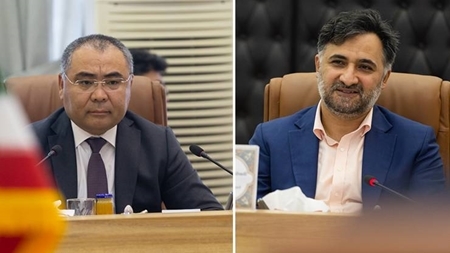
Ruhollah Dehghani, Vice President of Science, Technology and Knowledge-Based Economy, in a meeting with Ebrahim Abdurrahmanov, Minister of Science, Higher Education and Innovation of Uzbekistan, at the opening ceremony of Iran's Technology and Innovation House, which was held as a video conference, discussed the commonalities and cultural and historical background of the two countries. He considered it as the source and stimulus for the development of knowledge-based economic cooperation and said: Uzbekistan is one of the closest countries to Iran in terms of culture, history and economy. The two countries have many kinships with each other historically, for example, the two historical cities of Samarkand and Bukhara have a special place in Iranian literature. Even genetic studies have shown that Uzbeks have deep genetic similarities with Iranians, and this kind of deep-rooted and deep kinship makes the cooperation of the two sides go beyond the usual form and method, and serious cooperation and synergies develop in the fields of ideas, culture and people.
Development of knowledge-based economy in common subjects and axes
Emphasizing that bilateral cooperation in the fields of knowledge, business and technology, based on the economic commonalities of the two countries, can be a good basis for the progress of Iran and Uzbekistan, he added: these two countries have economic similarities and commonalities in many different fields. Among them, we can mention the mining economy and its related chains, in which both countries have experiences and capabilities. Agricultural economy and cotton production industry are among the other axes of cooperation between the two sides for the development of the value chain of the textile industry, from cultivation to product production.
Dehghani pointed out that health, treatment of diseases, medicine and medical equipment can be another axis of this bilateral cooperation, and said: We hope that by using the capacity of Iran's technology and innovation house in Uzbekistan, these cooperations will be developed and this house of technology and Innovation, the focal point of scientists' interaction, the exchange of technologies and innovations, and the cooperation of the knowledge-based economy.
The head of the National Elites Foundation considered the people of the two countries to be the axis and focal point of all cooperation between Iran and Uzbekistan and added: there are many common interests in the culture of the two countries, including the fact that the national literary figures of Iran, such as Hafez, have a special place in the culture of the people of Uzbekistan. have a special status, and from this point of view, Samarkand and Bukhara have been introduced as two valuable historical cities in Iranian textbooks, innovative and technological tourism can be one of the axes of interaction between the two countries.
Dehghani stated that the creation of Iran's technology and innovation house in Uzbekistan, in addition to continuing the previous cooperation, will lay the groundwork for cooperation between the two sides based on new issues, and continued: In addition to continuing and following up on previous agreements, we are ready to define new issues and topics of cooperation. These cooperations are based on the development of knowledge-based economy.
The vice president of science, technology and knowledge-based economy spoke about the knowledge-based economy and the cooperation of companies as the axis and basis of cooperation between the two countries and continued: Every technology should be developed according to the economic and market capabilities of that country and the business element of the knowledge-based economy in development plays an important role; Accordingly, the role of the economy, production and companies of the two countries is the main part of this cooperation. For example, artificial intelligence, information technology and machine building technologies can play a key role in completing the value chain and improving the technological resilience of areas such as agriculture, mining, textile, etc. If the technological cooperation is based on the economic advantages of the two countries, we will definitely see added value and more achievements.
Referring to Iran's interest in the presence and cooperation of Iranian knowledge-based companies in Uzbekistan and the use of the capacity of Uzbek companies, Dehghani continued: "If the conditions for facilitating cooperation are provided with closer standards, this cooperation will definitely develop." For example, in facilitating the registration of pharmaceutical data by Uzbekistan, Iranian knowledge-based companies can have a stronger presence in the health market of Uzbekistan, and good technological cooperation will also be established in this field.
He added: Therefore, if an economic cooperation and market development is formed between the two countries, cooperation and exchange of good technological experiences will definitely be formed between the technologists and scientists of Iran and Uzbekistan.
The President's vice president for science, technology and knowledge-based economy stated: The successful experience of Iran's mine pollution removal technology is being implemented in Uzbekistan, it shows that sustainable and economic-based cooperation can also lead to technological and knowledge-based cooperation. The cultural and historical commonalities and proximity of the two countries can facilitate cooperation.
Referring to the continuation of the scientific, technological and knowledge-based economic cooperation between the two countries under the joint cooperation committee, Dehghani continued: I believe that this committee will facilitate cooperation while pursuing the approved issues, and with the determination I see on the Uzbek side, I believe that the subcommittees with direct follow-up Officials from both sides can help expand cooperation more actively and seriously than the main committee.
The new chapter of technological cooperation between Iran and Uzbekistan in the shadow of the meeting of the presidents
Ebrahim Abdurrahmanov, the Minister of Science, Higher Education and Innovation of Uzbekistan, also referred to the development of scientific, technological cooperation and knowledge-based companies between Iran and Uzbekistan in the shadow of the visit of the president of this country to Iran and said: in these meetings, while emphasizing and continuing the previous cooperation and agreements, the necessary preparations and grounds for more and wider cooperation will be provided.
He considered some of the axes of cooperation to be advanced technologies such as energy, artificial intelligence, information and communications and fields such as agriculture, tourism and climate and added: We are ready to cooperate on the basis of these axes. The exchange of professors and students is another axis of cooperation that both sides can benefit from each other's knowledge and technological experiences.
Rahmanov considered the establishment of Iran's Technology and Innovation House in Tashkent, Uzbekistan as the result of two years' diligent efforts and interactions between the two countries and added:
During the technological cooperation between Iran and Uzbekistan two years ago, the need to have a center for the supply and exchange of technological achievements and capabilities of the two countries is felt, and with the activation of the Iran Technology and Innovation House in Uzbekistan, we hope for extensive cooperation between the companies of the two sides. The supply and demand sides of technology and scientists of the two countries should be formed.
The Minister of Science, Higher Education and Innovation of Uzbekistan, referring to the formation of a committee under the joint cooperation committee, to express strategic issues, headed by the scientific deputies of the two countries, said: In this sub-committee, by continuously holding meetings, various issues such as drug registration and other proposals are raised and The ground for its settlement is provided. This subcommittee can be a good place to express the main issues and seriously pursue the general issues of cooperation.
Rahmanov considered holding tenders for scientific and technological projects as one of the suitable platforms for the cooperation of the parties and added: These tenders can create a new form of technological cooperation between scientists and companies.
He expressed hope that Iran's experience in knowledge-based companies will be applied in Uzbekistan and 17 knowledge-based companies will increase in Uzbekistan.
Signing a 10-million-dollar contract in the field of energy
It should be noted that Iran's technology and innovation house in Uzbekistan aims to introduce Iran's knowledge-based, technological and creative products to the market of this country, knowledge interactions and facilitate cooperation and market development of Iran and Uzbekistan products, in a space of 400 square meters, including shared work space, meeting space and negotiations and establishment of companies in Tashkent city were launched.
This house of technology and innovation in the heart of a 4-story building, 3 floors of which are dedicated to shared space, is supposed to host knowledge-based and technological companies from both sides for commercial and technological cooperation, and in a specific public structure and frameworks determined by the two governments.
Some of these interactions have come to fruition and have provided the basis for the export of knowledge-based products to Uzbekistan, and in the future, this technology and innovation house is moving towards the facilitation and development of infrastructure for more serious cooperation in economic and technological activities.
iHit Tashkent has started its work with an investment of about 4 million dollars from a private sector investor, and at the beginning of this activity, a technological cooperation agreement worth 10 million dollars in the field of energy, with the cooperation of companies from both sides and under the support of this technology house and innovation is concluded. The establishment of this innovation house is in line with the approvals of the meeting between the presidents of Iran and Uzbekistan and will lay the groundwork for the expansion and facilitation of scientific, technological and economic cooperation between the two countries.
Vice Presidency of Science, Technology and Knowledge-Based Economy



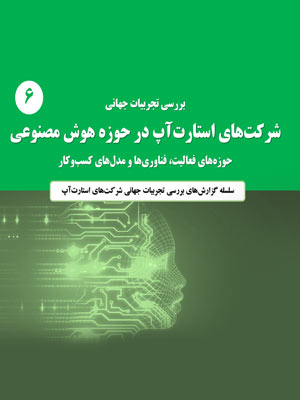


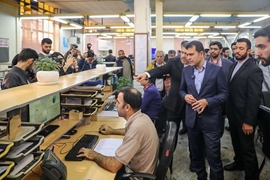
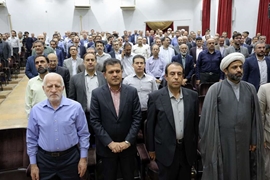
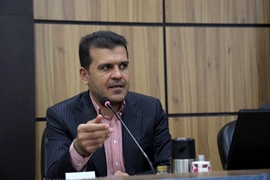
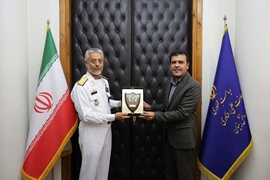

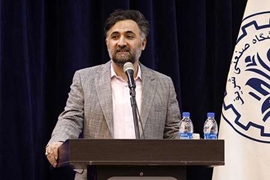
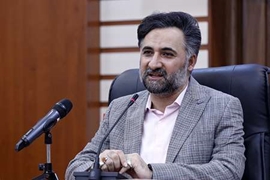
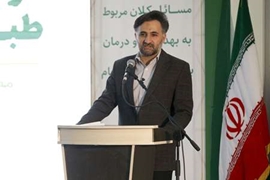
comment